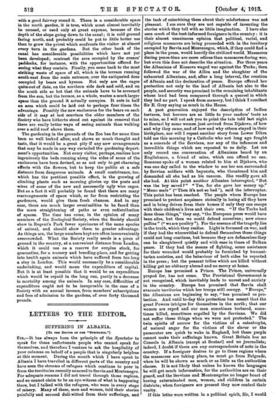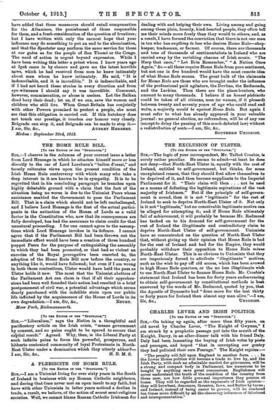LETTERS TO THE EDITOR.
SUFFERING IN ALBANIA. [To TER EDITOR Or THE 'Trier...Toil."] SIR,—It has always been the principle of the Spectator to speak for those unfortunate people who cannot speak for themselves, and therefore I venture to ask the hospitality of your columns on behalf of a people that is singularly helpless at this moment. During the month -which I have spent in Albania I have travelled in different parts of the country and have seen the streams of refugees which continue to pour in from the territories recently annexed to Servia and Montenegro. For adequate reasons I did not travel through those regions, and so cannot claim to be an eye-witness of what is happening there, but I talked with the refugees, who were in every stage of misery. Many of them, men and women, told their stories painfully and seemed dull-witted from their sufferings, and the task of catechizing them about their misfortunes was not pleasant. I am sure they are not capable of inventing the stories which they tell with so little imagination. I have also seen much of the best-informed foreigners in the country : it is their almost unanimous opinion that political, racial, and religious massacres are being proceeded with in the territory occupied by Servia and Montenegro, which, if they could find a place in the press, would horrify the civilized world. Massacres during peace-time are more odious than massacres during war, but even this does not describe the situation. For three years the Albanians of Kossovo waged war against the Turks ; then followed the war of the Allies and the slaughter of the exhausted Albanians, and, after a long interval, the creation of Albania and the declaration of peace. Europe offered her protection not only to the land of Albania but also to the people, and security was promised to the remaining inhabitants whose land had been conquered through a quarrel in which they had no part. I speak from memory, but I think I recollect Sir E. Grey saying as much in the House.
A past generation enjoyed the description of Indian tortures, but horrors are as little to your readers' taste as to mine, so I will not ask you to print the tale told last night at Scutari by some women just arrived from Djakova, of how and why they came, and of how and why others stayed in their birthplace, nor will I repeat another story from Lower Dibra told me this morning by a Catholic who not long ago fought as a comrade of the Servians, nor any of the infamous and incredible things which are repeated to us daily. Let mo only record one conversation of Albanians heard by an Englishman, a friend of mine, which can offend no one. Someone spoke of a woman related to him at Djakora, who was one day called to the window to see her son surrounded by Servian soldiers with bayonets, who threatened him and demanded all she had as his ransom. She readily gave all she had. At this point another Albanian interrupted, "But was the boy saved ?" " Yes, for she gave her money up." "Meno male" (" Then it's not so bad "), said the interrupter. This point has been reached. The people whom Europe has promised to protect acquiesce stoically in losing all they have and in being driven from their homes if only they can escape with their children's lives and their own. "If the Turks had done these things," they say, "the European press would have been afire, but then we could defend ourselves ; now slam o galline " (" we are poultry "). For the essence of the tragedy lies in the truth, which they realize. Light is focussed on war, and if they had the wherewithal to defend themselves these things could not long continue, but because they are defenceless they can be slaughtered quietly and with ease in times of Balkan peace. If they had the means of fighting, some assistance for their wounded would probably be furnished by humani- tarian societies, and the behaviour of both sides be reported in the press ; but the peasant tribes which are killed without killing get no obituary abroad and no mercy at hoine.
Europe has promised a Prince. The Prince, universally prayed for, has not come. The Provisional Government is not recognized, which inevitably leads to unrest and anxiety in the country. Europe has promised that Servia shall evacuate territories which her troops still occupy. "Europe," the Albanians are beginning to say, " has promised us pro- tection. And until to-day this protection has meant that the great Powers intrigue for themselves in the north; that our women are raped and our men sometimes tortured, some- times killed, sometimes expelled by the Servians. We did not suffer these things when we were not protected." The twin spirits of sorrow for the victims of a catastrophe, of natural anger for the victims of the slaver or the persecutor are quick to wake in England, but these people cannot make their sufferings known. Great Britain has no Consuls in Albania (except at Scutari) and no journalists; indeed, I doubt if there are any correspondents of note in the country. If a foreigner desires to go to these regions where the massacres are taking place, he must go from Belgrade, when lie will be shown as much or as little as the authorities choose. It is not likely that unless he knows the languages Ise will get much information, for the authorities are on their guard, and the Servians and Montenegrins no longer boast of having exterminated men, women, and children in certain districts ; when foreigners are present they now control their vanity.
If this letter were written in a political spirit, Sir, I would
have added that these massacres should entail compensation for the Albanians, the punishment of those responsible for them, and a fresh consideration of the question of frontiers; but I have written with only the earnest hope that your influence may do something to put an end to the abomination, and that the Spectator may perform the same service for those at our gates as for the people of San Thome or the Congo. The need of action is urgent beyond expression. While I have been writing this letter a priest whom I knew years ago at Ipek came in by chance and gave me the latest horrible news, which he had received from men he knew intimately about men whom he knew intimately. He said, "It is indescribable, and it is incredible." It is indescribable, and if I had not heard these stories in every direction and from eye-witnesses I should say it was incredible. Comment, however, commiseration, or abuse is useless. Let the Balkan dead bury their• dead ; let us, if we can, save the women and children who still live. When Great Britain has conjointly with other Powers promised to protect a people, she must see that this obligation is carried out. If this butchery does not touch our prestige, it touches our honour very closely. Belgrade can stop it, and Belgrade can be made to stop it.— I am, Sir, &c., AUBREY HERBERT. Iifedua : September 23rd, 1913.



































































 Previous page
Previous page